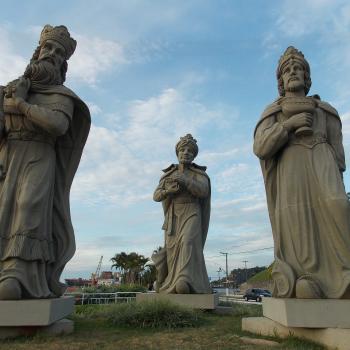 It’s tempting to cut this last post out of the series, stop while I’m ahead (if, that is, I am ahead). I’ve kindled some ire in the previous five posts, and this last has lots of fiery—as in, the stake—potential. And I’m not sure I can even articulate my concerns about this clearly or persuasively. So bear with me as I butcher my way through my thoughts.
It’s tempting to cut this last post out of the series, stop while I’m ahead (if, that is, I am ahead). I’ve kindled some ire in the previous five posts, and this last has lots of fiery—as in, the stake—potential. And I’m not sure I can even articulate my concerns about this clearly or persuasively. So bear with me as I butcher my way through my thoughts.
This is what the tagline at the bottom of all Donald Miller’s posts says:
Donald Miller is all about story. He’s helped thousands overcome a sense of meaninglessness by helping them create their Storyline life plan. If you’re struggling with a sense of meaningless, pick up Storyline today. After studying story for years and successfully using the elements of story to engage customers, Don created StoryBrand, a process any business owner or marketing team can go through to create a communication script that will increase sales. Don is also the creator of the Storyline Productivity Schedule, a free daily schedule using modern psychology to increase a person’s productivity. Don believes getting your story straight changes everything. Follow Don on Twitter (@donaldmiller). To read more of his posts on the Storyline Blog, click here.
Now, I like this theme: storytelling. I love good stories, and I think that an awful lot of spiritual formation is about developing the art of simultaneously “reading” your own story, of listening to God “tell” it, and of telling it back to God with your own flourishes. God loves good stories, and as a masterful Storyteller, he invites us into the Story that he is telling and makes room for our additions to the plot. We, like Lucy, Edmund, and Eustace, look at the picture of the ship at sea on the wall long enough that the waves begin to swell and the mist blows into our face and the room begins to lurch, and we, abruptly or gradually, find ourselves in it.
Donald Miller understands this too, I think. I agree with him: “getting your story straight changes everything.” His most recent book is called Storyline: Finding Your Subplot in God’s Story, and, from what I can tell on Amazon, it addresses this foundational work of understanding your life as a part of God’s grand Story. Maybe you should buy it.
So, then, what is my complaint? What is this myth that seems to be taking us off course?
My last myth of neo-Christianity is, again, very contemporary and deeply embedded in our culture. It plays itself out on nearly every television series—dramatic or comedic—and in every celebrity magazine exposé. It’s at its most dramatic on an Oprah Winfrey talk show, where the guests have amazing stories and Oprah mines them for the spiritual truths they reveal.
But worse, it has crept into Christian spirituality and warped it, making it increasingly difficult to be faithful. It pops up in a glut of Christian books and on countless church stages (and yes, they are stages). It rules on the Christian speaker circuit and plays into the ravenous media maw looking for something to go viral.
It’s the cult of the maverick, of the extraordinary, of the super story; it’s the cult of the hero.
Myth #6: My story needs a celebrity: me.
Our stories are important, and obviously, we are the center of our own stories. I’m not disputing any of that. And retelling our story with a God’s-eye view is a powerful spiritual exercise.
Augustine may have started the ball rolling. In his intensely introspective Confessions, he examines his life from head to toe, from infancy forward. Every memory finds its way onto the canvas as he paints the picture of his soul. Sometimes it’s downright excruciating, and wrestling with his endless scrutiny can become wearisome. (Especially when some professor assigns it and expects you to write a paper on it. Sheesh.)
Then Augustine does something odd toward the end of his book. In the last three sections of the book, he suddenly departs from his personal account, and moves into a reflection about Genesis, and creation, and time, and eternity. And at first read, I thought, “Where is this guy’s editor? Someone needed to cut those chapters out and make them a separate book.” But Augustine’s whole goal here is to make meaning of his story… and the meaning of his story is not in him. He is not the hero of his story. As Augustine moves out from his own memories, and the story God has been telling to him about himself, he cannot help but see the greater story that God is telling through him, with him, around him. And it’s not about him.
The glory of it is that Augustine’s story is not incidental or tangential, but fully a part of God’s Great Story; and that Augustine’s life is not coincidental or peripheral, but purposed from the Beginning; and that Augustine’s life is a continuation of what God has been doing, is doing, and will do. Augustine’s story has no great deeds, or unbelievable adventures; no catastrophes, no gallantry, no super-achievements. Nor is the story important or meaningful because of the hills he climbed, the addictions he overcame, the great works he did for the poor, the culture he overturned, the world he saved. There’s a reason it’s called Augustine’s Confessions, and not Augustine’s Triumph Over Heresy, or My Journey into Holiness: Ten Essential Steps to Spiritual Success, or Ambrose and Me, or How to Change the World. He would never have made it onto Oprah’s talk show…unless Confessions had been an Oprah Book Club pick.
I fear our celebrity mentality fosters a sense of dissatisfaction with the ordinary, the commonplace, the humble, quiet life lived in the obscurity of simple obedience to the call of God. We forget that for every Elijah, there were 7,000 unnamed faithful. For every Nehemiah, there were 42,360 returning exiles. For every Peter, James, and John, there were those other “forgettable” disciples whose names you can never quite remember. For every Mary Magdalene, there were the “many other women” who accompanied Jesus. Not every disciple is a celebrity. Nor do we need to conjure up a celebrity story to make meaning of our lives.
When I think of the authors and speakers who have most influenced me, their personal stories and accomplishments fade into the background. They rarely speak about them, nor do they use them as illustrations, nor do they form the center of their message. Like Paul’s own testimony, they are nothing but launching points for the great exploration of God’s story.
The Orthodox tradition teaches us this: our lives are hidden treasures, and talking about them too much “spends” them and thus diminishes them. Let them remain the secrets of God, not the fodder for a celebrity circuit.













